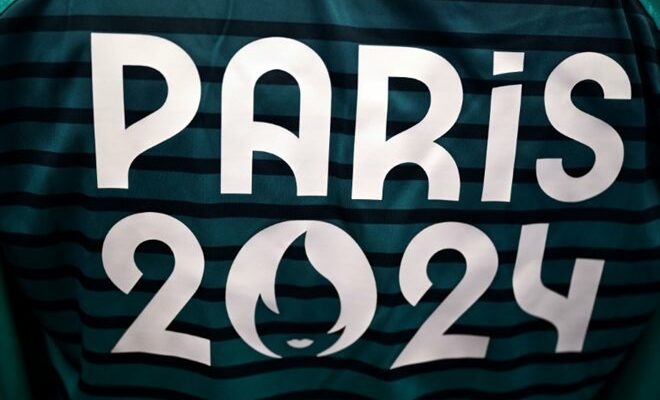A T-shirt made in Marseille for volunteers for the Paris 2024 Olympic Games, at the Fil Rouge company, March 18, 2024 (AFP/Christophe SIMON)
It’s a little piece of Olympism, green with black stripes, made in Marseille. Around half of the t-shirts that will be worn by the 45,000 volunteers for the Paris Olympic and Paralympic Games this summer are made by Fil Rouge, a local company committed to the solidarity economy.
Officially presented this Saturday in Nanterre, in the Paris region, during the Volunteers’ Convention, the complete volunteer uniform will be distributed from May by the French leader in the sale of sporting goods Decathlon.
It will then be visible everywhere this summer, on and off the Olympic sites, but in the meantime, production continues in the south of France.
In its factory in La Capelette, a former industrial and working-class district in the east of Marseille, Fil Rouge is responsible for making more than 100,000 t-shirts (each volunteer will receive four) and socks which will equip the volunteers.

Employees make clothes for volunteers for the Paris Olympic and Paralympic Games, March 18, 2024, in Marseille (AFP/Christophe SIMON)
The T-shirts, striped in a sailor style on a blue-green background, are cut randomly in the shade of green, in order to avoid as much waste as possible of fabric, made from recycled polyester produced in Vietnam.
– Covid and OM –
“It’s a very structuring project for us, which forced us to rethink our change of scale, which was already underway,” explains Jean-François Aufort, the boss of Fil Rouge, one of the four French suppliers associated with the project.
“In 2017-2018, Fil Rouge was a small SME in Marseille, with around twenty people. It was ready-to-wear in very small series, 50, 100 or 200 pieces per model,” he adds in the sound of sewing machines and machines cutting fabric.

An employee works on clothing for volunteers for the Paris Olympic and Paralympic Games, March 18, 2024, in Marseille (AFP/Christophe SIMON)
The group, which now employs more than 200 people, grew at the time of the Covid pandemic with the manufacture of masks on a very large scale and also worked with OM and the sporting goods manufacturer Puma on a jersey “Made in Marseille” in 2022.
The Paris-2024 project then “started with a simple phone call from Decathlon, who told us ‘we have a big project, are you interested in working with us?'”, says M .Aufort.
“Then, it happened naturally, as with any industrial project. Even if it’s a bit exceptional, of course, because we are participating in the Olympic Games in France, in Paris, which is not common,” he adds.
“I am very happy to have contributed to this event awaited by France and the whole world”, confirms Fathia Bacha, “seamstress by trade for over 30 years”, and responsible for fixing the collar on the flocked Paris jersey- 2024.
– Forty additional jobs –
The partnership with Decathlon around the Games also enabled Fil Rouge to create around forty additional jobs, around thirty of which are under integration contracts, a French system allowing people in social difficulty or with disabilities to find a job and benefit from follow-up.

The Paris 2024 logo on clothing made for volunteers for the Olympic and Paralympic Games, March 18, 2024, in Marseille (AFP/Christophe SIMON)
“Two of our four suppliers, Fil Rouge and Résilience in Roubaix, are in the network of social and solidarity enterprises”, which aims to bring or bring back to employment people who are far from it, explained to the AFP Virginie Sainte-Rose, director of partnership with Paris-2024 at Decathlon.
“Even for a structure like Cojo, this reading of the social economy is important, manufacturing in France too. There is an appetite among French consumers for more local, more ecological, socially responsible manufacturing,” judges Mr. Aufort who, with Fil Rouge, is now waiting to see the green jersey worn this summer on all Olympic sites.
“Of course it’s a source of pride. It will be seen everywhere, on all the televisions in the world!”
© 2024 AFP
Did you like this article ? Share it with your friends using the buttons below.




